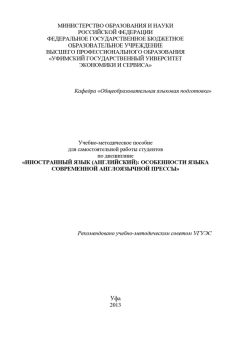Денис Шевчук - Английский для экономистов (учебник английского языка)
Все авторские права соблюдены. Напишите нам, если Вы не согласны.
Описание книги "Английский для экономистов (учебник английского языка)"
Описание и краткое содержание "Английский для экономистов (учебник английского языка)" читать бесплатно онлайн.
Английский для экономистов – учебное пособие предназначено для студентов экономических специальностей и рассчитано на лиц, обладающих знанием нормативной грамматики английского языка и имеющих словарный запас в 2000 лексических единиц.
Английский язык для экономистов состоит из 8 разделов, охватывающих широкий круг тем по экономике и бизнесу: экономика, организация, бизнес, менеджмент, маркетинг, реклама, деньги, банки, финансы, бухучет, аудит, резюме экономиста на английском языке и др. Все тексты взяты из оригинальных английских и американских источников. Разделы (равно как и тексты) могут прорабатываться в представленной последовательности или выборочно – в зависимости от целей, задач и уровня подготовки группы, изучающей английский для экономистов. Это эффективный учебник английского языка для экономистов (деловой английский для экономистов).
Sometimes the entrepreneur is regarded as a business person who takes risks. This is not so. An entrepreneur is a business person who minimizes risks. He or she does this by advance planning, research, and meticulous consideration of all factors that could affect and possibly endanger her or his enterprise. When the entrepreneur forgets to do advance investigation and preparation, then he or she is a gambler at best, and a failure statistic at worst.
Speaking about entrepreneurship, Professor K. Vesper of the University of Washington says that “ Businesses continue to be launched by people who didn’t make it the first time around. A driving force in entrepreneurship… is addictiveness. Once people have a taste of freedom in a business of their own, they like it. They don’t want to go back to working for someone else.”
While the percentage of growth for men entering into business independence could be measured in the teens, women’s increase in a single decade was 69 percent. There is no mystery here. Women go into business for the same reason men do – to make money and to be their own bosses. The rise in female entrepreneurship is reminiscent of what the early-20th-century immigrants did – and the more recent waves of immigrants from different parts of the world. Entrepreneurship is regarded to be the first track to success. Rather than to take low-wage, big-industry job, people opt to use their wits and energy to climb the ladder of independence the entrepreneurial way.
The American magazine Venture attempted to dissect entrepreneurs and to see what makes them tick. They conducted a survey to which 2,740 readers responded. Here is what they had in common:
1) Typically they were firstborn children who had a positive relationship with their father. (2) They held jobs before they were 15 and started their first businesses by the time they reached 20. (3) They borrowed money to launch their enterprises and made themselves personally liable. (4) Most of them are college graduates, consider themselves demanding of others, and start work early in the day (82 percent start work before 9 a.m.). (5) Twenty percent described themselves as successful; another 53 percent claimed moderate success; 27 percent reported the expectation of success.
While these entrepreneurs are intrepid adventurers on the business sea, they still seek the approval of others – often after they have launched an action. Respondent Richard M. Ask, president of the 2000-member National Association of Entrepreneurs, wrote, «I go out and do what I damn well please, and then I look around for approval to reinforce the action».
How old are the people who start new businesses? The majority are 30 to 34, with the biggest segment (70 percent) between 25 and 44.
With what do entrepreneurs start up new businesses? How much money do they invest? Most businesses require between $20,000 and $50,000 in cash. The vast majority of business start-ups (87 percent) are in the range of a few thousand dollars to $100,000.
Which businesses are the most popular? There is no doubt that retailing is number one. Nearly half of all new business start-ups are retail shops. Here is the line-up:
1. Do you belong to the people who are comfortable with a nine-to-five existence? Are there many people of this type among your friends, relatives, colleagues?
2. “Calculated risk’ – what is it?
3. Give your variant of an entrepreneur profile (age, traits of character, business, backgrounds, etc.)
TEXT 9
THE FIELD OF INTERNATIONAL BUSINESS
International business includes all business transactions that involve two or more countries. Such business relationships may be private or governmental. In the case of private firms the transactions are for profit. Government-sponsored activities in international business may or may not have a profit orientation.
There are three major motivations for private firms to pursue international business. These are to expand sales, to acquire resources, and to diversify sources of sales and supplies.
Sales expansion. Sales are limited by the number of people interested in a firm's products and services and by customers' capacity to make purchases. Since the number of people and the degree of their purchasing power is higher for the world as a whole than for a single country firms may increase their sales potentials by defining markets in international terms.
Ordinarily higher sales mean higher profits. If, for example, each sales unit has the same mark-up, more volume translates to more profits. Lucas film, for example, receives a percentage of the sales made by companies marketing Star Wars merchandise; thus Lucas film's revenues increase with each addi–tional toy that Parker Kenner sells in the United Kingdom. In fact, profits per unit of sales may increase as sales increase. Star Wars cost approximately $10 million to produce; as more people see the film, the average production cost per viewer decreases.
International sales are thus a major motive for firms' expansion into international business. A United Nations study indicated that among the largest industrial firms in the world, about 40 percent of their sales come from outside their home markets.
Resource acquisition. Manufacturers and distributors seek out products and services as well as components and finished goods produced in foreign countries. Sometimes this is to reduce their costs: for example, Lucas film used studios in the United Kingdom in the filming of Star Wars and Kenner manufactures its Laser Pistol in Hong Kong. The potential effects on profits are obvious. The profit margin may be increased, or cost savings may be passed on to consumers, thereby permitting more people to buy the prod–ucts.
Diversification. Companies usually prefer to avoid wild swings in their sales and profits; so they seek out foreign markets and procurement as a means to this end. Lucas film has been able to smooth its yearlong sales somewhat because the summer vacation period (the main season for children's film attendance) varies between the northern and southern hemispheres. It has also been able to make large television contracts during different years for different countries. Many other firms take advantage of the fact that the timing of business cycles differs among countries. Thus while sales decrease in one country that is experiencing a recession, they increase in another that is undergoing recovery. Finally by depending on supplies of the same product or component from different countries, a company may be able to avoid the full impact of price swings or shortages in any one country that might be brought about, for example, by a strike.
1.How would you define the concept ‘international business’?
2.What are the main motives for a firm to join international business?
TEXT 10
Read the text and be ready to speak about the main types of international business. Explain the meanings of the words and word combinations which have been highlighted.
TYPES OF INTERNATIONAL BUSINESS
Merchandise exports are goods sent out of a country whereas merchan–dise imports are goods brought in. Since these are tangible goods that visibly leave and enter countries, they are sometimes referred to as visible exports and imports. The terms exports or imports are used frequently yet in reality the reference is only to the merchandise exports or imports.
Exporting and importing of goods are the major sources of international revenue and expenditure for most countries. Among companies engaged in some form of international business, more are involvedin importing and exporting than in any other type of transaction.
Importing and/or exporting is usually but not always, the first type of foreign operations in which a firm gets involved. This is because at an early stage of international involvement these operations usually take the least commitment and least risk of a firm's resources Exporting or importing are not typically abandoned when firms adopt other international business forms. Although this may sometimes occur, exporting and importing usually continue, either by business with other markets or to complement the new types of business activities.
Service exports and imports refer to international earnings other than those from goods sent to another country. Receipt of these earnings is considered a service export, whereas payment is considered a service import. Services are also referred to as invisibles. International business comprises many different types of services.
Travel, tourism, and transportation. Earnings from transportation and from foreign travel can be an important source of revenue for international airlines, shipping companies, reservations agencies, and hotels. On a national level, such countries as Greece and Norway depend heavily on revenue collected from carrying foreign cargo on their ships. The Bahamas earns much more from foreign tourists than it earns from exporting merchandise.
Performance of activities abroad. Fees are payments for the performance of certain activities abroad, such services as banking, insurance, rentals (e.g., the Star Wars film), engineering, and management. Engineering services are often handled through turn-key operations, contracts for the construction of operating facilities that are transferred to the owner when the facilities are ready to begin operations. Fees for management services are often the result of management contracts, arrangements through which one firm provides management personnel to perform general or specialized management func–tions for another firm.
Use of assets from abroad. Royalties are the payment for use of assets from abroad, such as for trademarks, patents, copyrights, or other expertise under contracts known as licensing agreements. Royalties are also paid for franchising, a way of doing business in which one party (the franchisor) sells an independent party (the franchisee) the use of a trademark that is an essential asset for the franchisee's business. In addition, the franchisor assists on a continuing basis in the operation of the business, such as by providing components, managerial services, or technology.
Firms often move to foreign licensing or franchising after successfully building exports to a market. This move usually involves a greater interna–tional commitment than in the early stages of exporting. The greater involve–ment occurs because the firm commonly has to send technicians to the foreign country to assist the licensee or franchisee in establishing and adapting its production facilities for the new product.
Direct investments. Direct investment takes place when control follows the investment. This can amount to a small percentage of the equity of the company being acquired, perhaps even as little as 10 percent. The ownership of a controlling interest in a foreign operation is the highest type of commitment to foreign operations in the given country. Direct investment operations may be set up in order to gain access to certain resources or access to a market for the firm’s product.
When two or more organizations share in the ownership of a direct investment, the operation is known as a joint venture. In a special type of joint venture, a mixed venture, a government is in partnership with a private company.
The multinational enterprise, or MNE, has a worldwide approach to foreign markets and production and an integrated global philosophy encompassing both domestic and overseas operations. The term multinational corporation, or MNC, is also quite common in the literature of international business. Another term sometimes used interchangeably with MNE, especially by the United Nations, is transnational corporation, or TNC.
Ex. 10. Translate the following into English.
Индивидуальные усилия; не достигают успеха; достичь цели; неспособные выполнить; относительно рано; первичный элемент; в своей первой попытке; отвечать потребностям; деятельность, которая поддерживает; сеть отношений; способствовать сотрудничеству; официальное признание; от своего имени; обладать властью; выполнять обязанности; официально признан; необходимость разделить работу; обозначается термином; процесс передачи обязательств; от выше стоящего к подчиненному; не может существовать и процветать; иерархическая организация; составляют основные компоненты; управленческий инструмент; разделение по функциям; которые сталкивались с необходимостью; большие скопления ресурсов.
Ex. 11. Add an appropriate preposition to each of the following sentences where indicated.
Organizational controls
An organization can best achieve its objectives when its members require a minimum … supervision because they are competent and goal-oriented. Nevertheless, even … optimal conditions of individual commitment and self-control, organizations need formal controls. The control function of organizations consists … the following:
1. Establishing standards … which all aspects of organizational life are evaluated.
Most organizations have formal standards relating … spending, production, sales, product quality, safety, inventory, personnel selection, acceptable employee behavior, and so forth.
2. Establishing feedback system by which actual performance is compared … predetermined standards.
These are best exemplified … management reports which show, often … a daily basis, expected and actual performance.
3. Taking appropriate action to ensure that substandard performance is improved and that standards will be met … the future.
It is common practice to refer … the standards and feedback systems as controls although it should be obvious that they serve a control function only if managerial action is involved. They are not a substitute … supervision, but they minimize requirements for personal supervision.
Read the text once again and answer the following question: What are the control functions of organization?
Ex. 12. Read the text. Fill in the gaps with the missing words given below.
Monitor, interrelate, integral, report, exaggerate, law, impact, flow of cash, resources, customers, stock, range, information, activity, prerequisite, process, subject, nervous.
Подписывайтесь на наши страницы в социальных сетях.
Будьте в курсе последних книжных новинок, комментируйте, обсуждайте. Мы ждём Вас!
Похожие книги на "Английский для экономистов (учебник английского языка)"
Книги похожие на "Английский для экономистов (учебник английского языка)" читать онлайн или скачать бесплатно полные версии.
Мы рекомендуем Вам зарегистрироваться либо войти на сайт под своим именем.
Отзывы о "Денис Шевчук - Английский для экономистов (учебник английского языка)"
Отзывы читателей о книге "Английский для экономистов (учебник английского языка)", комментарии и мнения людей о произведении.



















